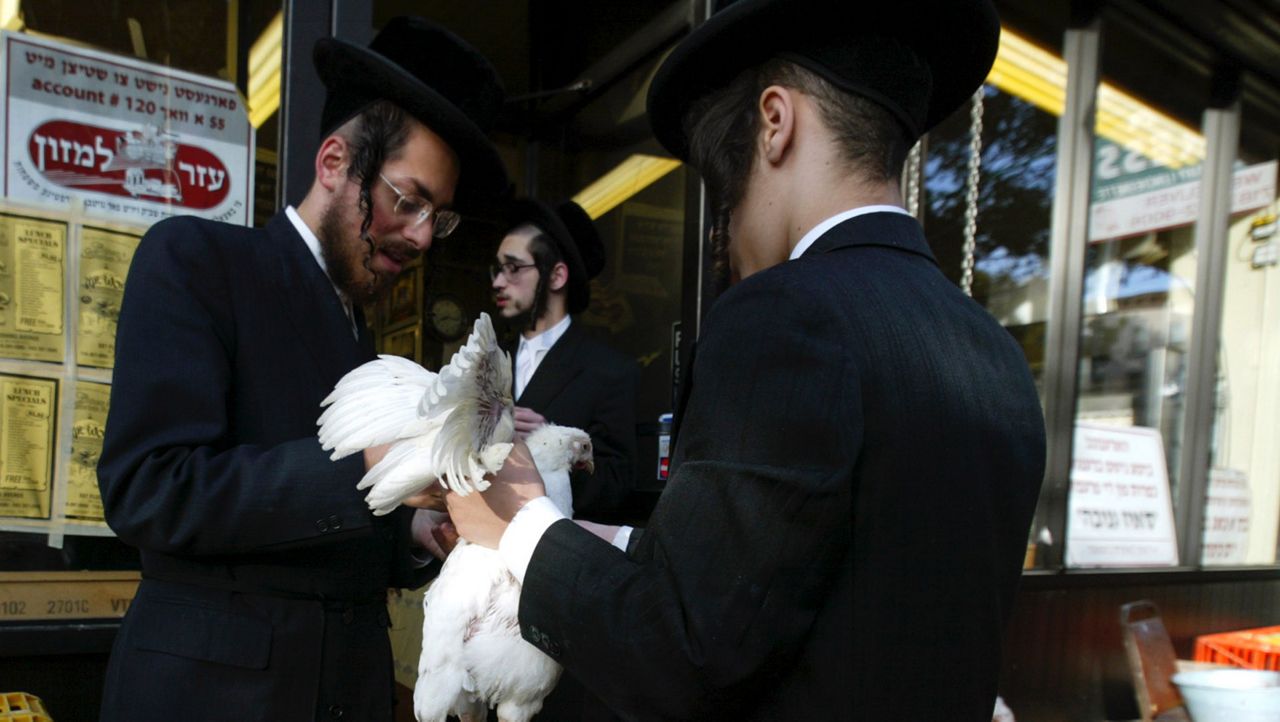NEW YORK CITY — Anti-Kapporos crusaders are relaunching a legal attack against the Orthodox Jewish ritual — which involves slitting throats of tens of thousands of live chickens in the streets of New York City — arguing the novel coronavirus pandemic presents new evidence it’s harmful to human health.
“This is a real danger now that needs to be recognized,” attorney Nora Marino said. “It’s not about what could happen, it’s about what has happened.”
Marino, who represents the Alliance to End Chickens as Kaporos (the name has multiple accepted spellings) filed this month a motion to renew her case — struck down in 2018 by the New York Court of Appeals — and compel the NYPD to enforce Health Department codes she says are routinely broken during the pre-Yom Kippur atonement ritual.
In her motion, Marino argues the COVID-19 pandemic represents new evidence of the dangers of public animal slaughter, drawing comparisons to the wet markets of Wuhan where some scientists believe the pandemic started its spread, although the origin is still under investigation.
“It’s not about what could happen,” Marino said. “It’s about what has happened because of a live animal wet market.”
It remains unclear whether a Manhattan supreme court judge will sign off on Marino’s motion, or when, considering the upheaval caused by the COVID-19 shutdown.
But Marino says there is no time to wait.
“We can’t afford to be reactive, we have to be proactive,” Marino said. “The health codes must be enforced.”
While Marino is among a select group focused on banning Kapporos, she is among a broader group of New Yorkers who worry about more than 80 live markets in New York City.
Assembly member Linda Rosenthal and state Senator Luis Sepulveda both proposed legislation in May that would temporarily shutter the live markets — where chickens, rabbits, lamb and goats are selected and slaughtered on the spot — until the risk they pose can be studied.
Rosenthal did not reply to NY1’s request for comment, but Sepulveda said Kaporos remains for him a serious issue and hopes to address the issue in the months to come.
“When you take into consideration the crisis this country is in now, we need to protect all communities,” Sepulveda said. “We need to make sure the Jewish community is protected.”
The bill has drawn Sepulveda into conversations with state Senator Simcha Felder, whom he said has shown support for moving Kapporos toward synagogues and swapping bags of money for the sacrificial fowl.
“We’re not out to kill business or stomp on anyone’s religious beliefs,” Sepulveda said. “If it’s for safety, we can infringe a religious practice… If it’s going to make us safer, the state has a right to do that.”
New York Assembly member Simcha Eichenstein — who represents Borough Park, a neighborhood many in the Orthodox Jewish community call home, and is himself Hasidic — argued the ritual is just as sanitary as any other form of animal slaughter.
“When I look at why there may be more scrutiny on Kapparos than factory farming, it seems apparent that it is because Kapporos are in open sight versus factory farming which takes place behind closed doors,” Eichenstein said.
“The fact remains that Kosher slaughter, as compared to factory slaughter, is much more humane.”
But infectious disease expert Dr. Stephen Baum, distinguished professor at Albert Einstein College of Medicine’s Department of Microbiology and Immunology, argued any point of contact between human and animal merits a closer look.
Baum recalls with fondness the days his grandmother came home with a headless live market chicken, and has seen Kapporos provide comfort in the wards of his intensive care units, but he’s concerned about the increase in zoonotic infections, such as COVID-19, he’s witnessed over the course of several decades.
“The theme is that animals can carry infections and they are increasing from animals to humans,” Baum said. “I do really believe [the live market] represents a major health risk.”
Baum urges New Yorkers to avoid live markets and Kapparos, noting the ritual of swinging chickens overhead could send aerosols into the air that are best avoided.
While there are few known diseases transferred from fowl to human, one of them, avian flu, can be quite serious, Baum said.
“I don’t think there is great danger in doing this,” Baum said. “But I think exposure to live birds is not a good thing.”
But Baum doubts legislation or lawsuits will stop a ritual so significant to the people who practice it.
Said Baum, “The intersection where religion and health meet is a busy and dangerous one."
And the danger that comes with limiting religious expression is not one to be ignored, argues Agudath Israel, an organization that has been representing Orthodox communities across the world for more than a century.
A representative for the group’s American branch, said she was saddened by what she described as an attack against the Orthodox Jewish community.
“The opponents of kapporos, having failed in all of their previous legal efforts, are now mobilizing the current health crisis to formulate wholly unsubstantiated claims to resurrect their case and further their agenda,” the spokesperson said in an email.
“We are hopeful that this latest attempt will be dismissed by the court as spurious, as were the previous motions.”
Marino said the risk of fighting an unwinnable battle has not stopped her before and it won’t stop her now.
“I believe my position is correct, and my client’s position is just and necessary to protect the public health,” Marino said. “We can’t look at this situation with the same eyes anymore. We’re post-COVID.”
